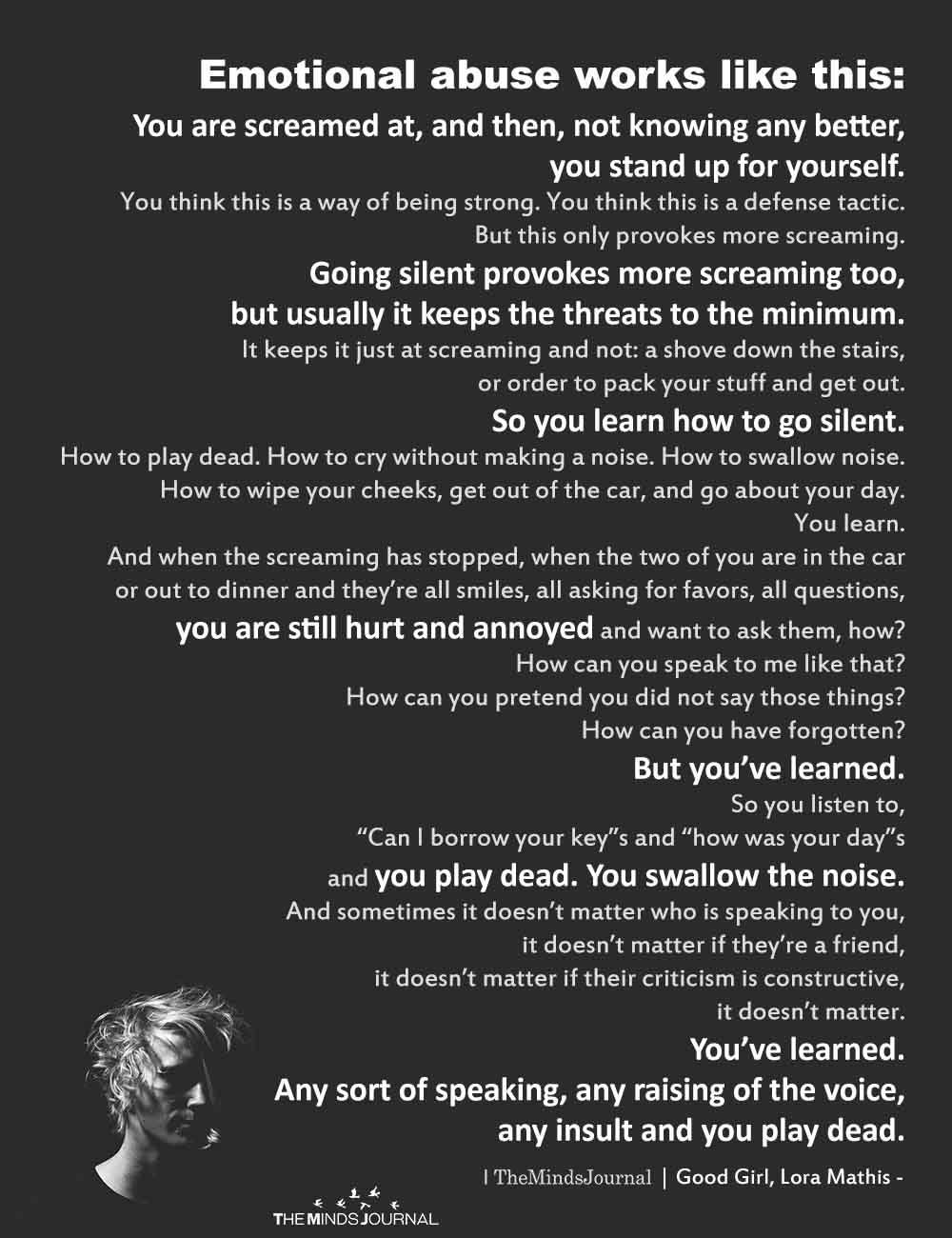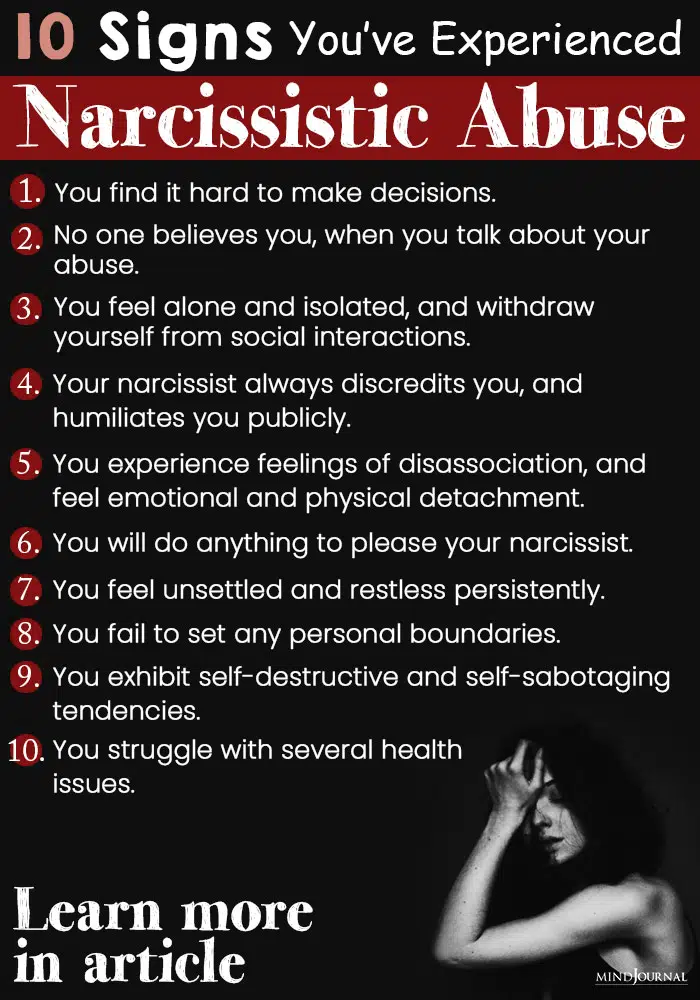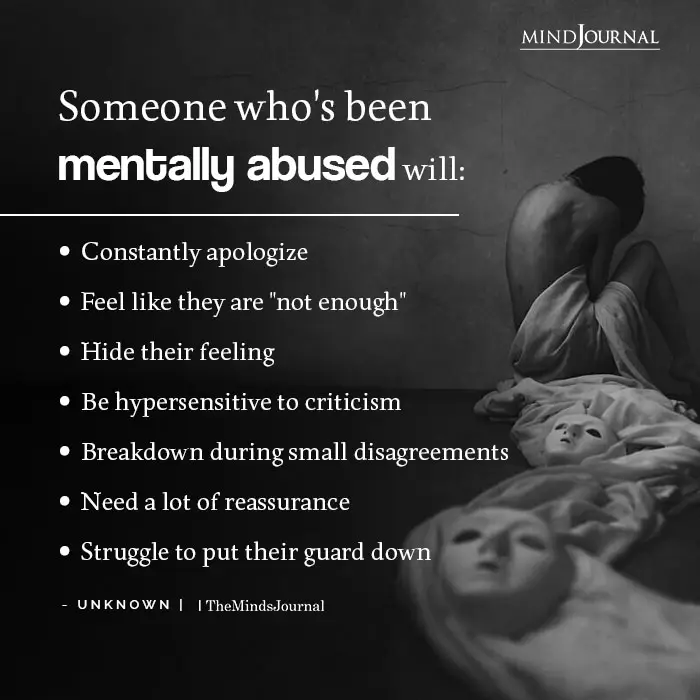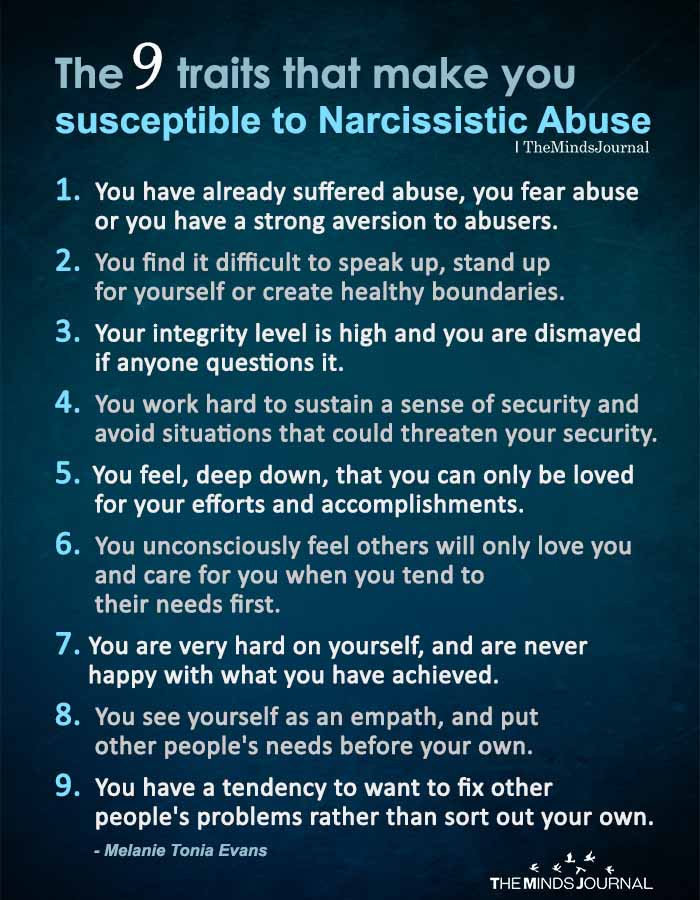Is your partner a narcissist? People in relationships with narcissists often endure severe abuse and dysfunctional behavior that can seriously affect them in the long run. Such exploitation can lead to a condition identified as narcissistic abuse syndrome in the victim. Let us take a closer look at the signs and symptoms of this new mental health issue.
What is Narcissistic Abuse Syndrome (NAS)?
Also known as Narcissistic Victim Syndrome, it refers to a collection of behavioral and psychological symptoms that are observed in victims of narcissistic abuse. Narcissists tend to have an inflated sense of self and are obsessed with themselves.
If you have been in a relationship with a narcissist or spend a substantial amount of time with them, then you are probably affected by Narcissistic Abuse Syndrome (NAS). As the narcissist programs the victim through their deviant and abnormal behavior, they become conditioned to feel how the narcissist wants them to feel.
People with this condition lack self-confidence and have high levels of self-doubt. They have a poor sense of self-worth and constantly doubt their sanity. They are intensely anxious and aware of their own mistakes, failures, and imperfections even if these are simply a figment of their own imagination. In most cases, they start believing that they are flawed and deserve to be abused due to the conditioning by their narcissistic partner.
The condition is also identified as Post Traumatic Narcissism Syndrome (PTNS) and Trauma-Associated Narcissistic Symptoms (TANS), according to author Christine Hammond, MS, LMHC.
Related: Are You A Victim Of Narcissistic Abuse?
This is how NAS affects you
Narcissists are masters in playing mind games. They use a wide range of manipulative strategies that stifle their victims, such as gaslighting, triangulation, and projection. As victims constantly live in a warzone riddled with landmines of love-bombing, devaluation, and abuse, they struggle every moment to hold on to their sanity.
In a MedicalNewsToday article, national speaker and author Mary Jo Fay, RN, MSN explains that people with Narcissistic Abuse Syndrome “are frequently rather nervous, with a guilt-ridden, anxious look and effect. They may appear restless, worried, and/or demonstrate a fake laugh that seems to hide something else.” Living with a narcissist in command means opening yourself up to invisible abuse that even you won’t realize at times.
Although a narcissist may or may not abuse you physically or sexually, they will launch a barrage of imperceptible assaults on your identity, mind, heart, and spirit. Narcissistic abuse often goes unnoticed until the damage is irreparable and extensive.

Although there is a lack of research on Narcissistic Abuse Syndrome, it has been observed that more women than men suffer from this condition. Moreover, women in their 20s, 30s, and 40s are more likely to fall victim to narcissistic abuse.
If you are suffering from this condition, then it is likely that you will have distorted thinking and feel confused due to constant emotional manipulation and abuse from your partner. You may start to question your reality and may even experience symptoms similar to post-traumatic stress disorder (PTSD). You may experience intense stress, severe anxiety, fatigue, depressed mood, and even physical pains and aches for unknown reasons.
Symptoms of Narcissistic Abuse Syndrome
Although some of the common symptoms of this condition can be identified easily by most victims of narcissistic abuse, you may not be able to realize certain signs or be willing to notice them while you are conditioned by a narcissist. Moreover, some of these specific elements of Narcissistic Abuse Syndrome overlap with Post-Traumatic Stress Disorder or PTSD.
Some of the common symptoms of NAS may include the following physical and psychological symptoms:
1. Physical symptoms
- Weight loss or gain
- Angry outbursts
- Rapid heart rate
- Muscle aches and pains
- Vomiting and nausea
- Insomnia or frequent nightmares
- Eating disorders
- Stomach pain, upset stomach or gastrointestinal issues
- Fatigue
2. Psychological symptoms
- Intense anxiety, nervousness & extreme fear
- Depression
- Trouble concentrating and impaired memory
- Phobias
- Insecurity
- Delusions
- Shame, irritability and guilt
- Panic attacks
- Suicidal behavior
- Obsessive-compulsive behaviors
- Self-criticism and self-blame
- Ruminations or intrusive, repetitive & unwanted thoughts
- Flashbacks of a traumatic or abusive experience
- Physical or emotional triggers
- Social withdrawal and isolation
- Avoidance of triggering situations or people
- High alertness or being constantly vigilant
- Self-doubt
- Seeking help
These symptoms are often caused by the toxic behavior of the narcissist who feeds their own ego by hurting or emotionally damaging the victim.
Related: 7 Myths About Narcissistic Abuse That Need To Be Dismissed Now
10 Signs You’ve Experienced Narcissistic Abuse: How to identify Narcissistic Abuse Syndrome

Psychological abuse advocate Jayme Chenoweth of Narcissistic Victim Syndrome explains that this condition “often causes victims to feel defenseless and beaten down.” Narcissistic Victim Syndrome is a serious and debilitating issue that you should not ignore for the sake of your own mental and emotional well-being. Here are a few signs that you need to identify to determine if you are suffering from this condition and need to seek help:
1. You’re unable to make decisions
As you lack self-confidence, have low self-esteem, and constantly doubt yourself, you find it difficult to take any decision for yourself. Continuous criticism and devaluation can make you fully dependent on your abuser and make you second-guess yourself over time.
As you go through frequent manipulation, domination and absorb constant insults, your decision-making abilities start to become weaker. This can also make it difficult for you to decide whether you should leave your narcissist or tolerate their abuse.
2. No one believes you’re abused
Narcissists often use subtle and hidden strategies to manipulate and control their victims. Emotional abuse is often hard to identify and even harder to prove to others. The abuse can be so effectively disguised by your narcissist, that your friends and family may fail to notice it, even when it occurs in front of them.
Although your family and friends may not doubt your claims of abuse, they may feel that you are misunderstanding the situation or may ask you to change your perceptions. This can leave you feeling more confused, disappointed, guilty, and filled with further self-doubt.
Related: How Narcissistic Abuse Changes You
3. You feel isolated
Most narcissists often tend to isolate their partners as it can make you more vulnerable to emotional manipulation. However, you may also isolate yourself due to shame and self-doubt as well. Moreover, as others may not believe that you are being abused, you may feel alone and withdraw from social interactions. Various other factors like misconceptions about abuse, victim-blaming, and lack of social support may push you further towards isolation.
Bestselling author Shahida Arabi explains that people with Narcissistic Abuse Syndrome “fear no one will understand or believe them, so instead of reaching out for help, they decide to withdraw from others as a way to avoid judgment and retaliation from their abuser.”

4. Your narcissist discredits you
The narcissist’s smear campaign can not only make you look bad in front of others, but it can also make others criticize you and make them appear perfect. They can distort the truth to earn admiration from others and disprove you and your claims of being abused. What’s worse, they can use your reactions against you to gain sympathy from others. Hence, they can charm and win over your friends and loved ones making you look like the abuser.
5. You experience dissociation
Narcissistic Abuse Syndrome can often lead to feelings of dissociation which you may use as a survival mechanism. You may experience physical or emotional detachment from the environment leading to disruptions in consciousness, perceptions, memories, and your sense of self. Dissociation allows your brain to prevent the emotional impact of your pain from affecting you excessively and result in emotional numbing.
This can especially happen when you are unable to cope with the terror and trauma of the existing circumstances. Shahida adds “Mind-numbing activities, obsessions, addictions, and repression may become a way of life because they give you an escape from your current reality.”
Related: What is Narcissistic Abuse: 16 Signs To Identify And How To Protect
6. You will do anything to please them
The effects of narcissistic abuse can make you sacrifice your own physical and emotional needs, safety, and desires to please your narcissistic abuser. Although you may have been a confident and ambitious person when you met them, now you only aspire to fulfill their needs and desires. As your whole life revolves around your abuser, your career, goals, relationships and even safety take a backseat.
Your primary objective is to make sure that your narcissist is satisfied with you and the relationship. This can go to such an extent that you end up protecting your abuser and criticizing yourself. “Rationalizing, minimizing, and denying the abuse are often survival mechanisms for victims in an abusive relationship,” explains Shahida.
7. You feel restless
One of the clear signs of Narcissistic Abuse Syndrome is that you feel unsettled and restless persistently. Narcissistic abuse is unpredictable with periods of love bombing and exploitation occurring either alternatively or even simultaneously. This can put you in a state of constant alert as you feel you are walking on eggshells. You never know when your narcissist will love you or when they insult you. This can result in high levels of stress and anxiety affecting your mental health in the long run.
“You become perpetually anxious about ‘provoking’ your abuser in any way and may avoid confrontation or setting boundaries as a result,” writes Shahida Arabi.
8. You fail to set any boundaries
Narcissists have no respect for your personal boundaries. They will continually ignore or challenge any healthy boundaries or limits you try to establish. The more you try to hold on to your boundaries the more they will manipulate or abuse you until you feel compelled to put down your guards and give in to their demands. They may even keep exploiting your boundaries once the relationship is over by pulling you into their trap once again. This is known as hoovering.
Related: Why Narcissistic Abuse Syndrome Is The Wrong Word About Your Condition
9. You engage in self-destruction
People suffering from Narcissistic Victim Syndrome are highly prone to excessive rumination and negative self-talk which can lead to self-destructing and self-sabotaging tendencies. Victims of malignant narcissists are often conditioned and programmed to engage in self-destructive behavior which can even lead to self-harm and suicidal attempts. You may end up sabotaging your education, career, and life goals.
Shahida adds “Due to the narcissist’s covert and overt put-downs, verbal abuse and hypercriticism, victims develop a tendency to punish themselves because they carry such toxic shame.”
10. You struggle with health issues
Your psychological and emotional pain may manifest itself through physical and somatic symptoms. Victims of narcissistic abuse experience severe stress, anxiety, and depression that can adversely affect their health. If you are experiencing Narcissistic Abuse Syndrome, then you may experience certain physical health issues like weight gain or loss, insomnia, premature aging, etc.
You may also suffer from certain physical ailments and diseases that you have never experienced before. You may also become vulnerable to alcohol and other substance abuse as you desperately try to cope with the abuse and trauma.

What triggers Narcissistic Abuse Syndrome
If you have a narcissistic partner, then they may use emotional manipulation and abuse to create unhealthy attachments and trauma bonds so that it is nearly impossible for you to leave them. They get you addicted to trauma bonding by abusing you for a certain period of time and then love bombing you for a subsequent period of time. This makes you long for your narcissistic abuser even after the relationship is over, irrespective of how abusive they were.
As you become codependent on your partner, they will continue to destroy your sense of self and self-esteem unless they gain complete control over you. “While victims of Narcissists are generally codependents, most have no idea how they got in this situation because in the early stages of the relationship the Narcissistic person can be the most charming,” explains author Mary Jo Fay.
NAS is usually triggered by –
- Mental, emotional, and spiritual abuse
- Shaming
- Smear campaigns
- Gaslighting
- Projection
- Belittling
- Threats
- False narrative
- Baiting and bashing
- Circular or distortion of conversations
- Exploitative mind games
- Disguised or hidden abuse
- False accusations and diversion
- Omission of facts
Is NAS a genuine medical diagnosis?
Although narcissistic personality disorder (NPD) is identified by the American Psychiatric Association’s Diagnostic and Statistical Manual of Mental Disorders (DSM-5), Narcissistic Abuse Syndrome is not recognized as a medical condition. Moreover, there is little credible literature on the condition and the effects of narcissistic behaviors on the mental health of people who live or work with such toxic, abusive narcissists.
However, many therapists believe that this syndrome should be clinically recognized. Healthline explains “While it’s not a recognized mental health condition, many experts acknowledge narcissistic abuse can have a serious, long-lasting impact on emotional health.”
Related: The Narcissist’s Cycle Of Abuse
The term syndrome is derived from the Greek word “syn”, meaning together, and “dramein”, meaning to run. Hence, the word syndrome refers to correlated symptoms which run together and are associated with a certain physical or mental disorder or condition. Narcissistic Abuse Syndrome or Narcissistic Victim Syndrome is a set of symptoms caused by spiritual, emotional, psychological, and physical abuse by a narcissist.
Christine Louis de Canonville, a psychotherapist and author of the book The Three Faces of Evil: Unmasking the Full Spectrum of Narcissistic Abuse, explains “In order to be able to diagnose a client suffering with Narcissistic Victim Syndrome, the therapist needs to be able to gather together the signs and symptoms and access the client’s psychological make-up as their story unfolds.” This will help the therapist to understand if you are actually suffering from NAS or a milder form of abuse that has affected your mental well-being.
What are the 9 official criteria for narcissistic personality disorder (NPD)?
According to studies, the Diagnostic and Statistical Manual of Mental Disorders (DSM-5) defines narcissistic personality disorder (NPD) as a pervasive pattern of lack of empathy, need for admiration and grandiosity that involves at least 5 of the following criteria:
- A grandiose sense of self-importance
- Preoccupation with fantasies of power, success, intelligence, beauty or ideal relationships
- A strong belief of being “special” and should associate only with other “special” or high status individuals or institutions
- Intense need for excessive admiration
- A strong sense of entitlement, such as unrealistic expectations from others
- Exploitative behavior & takes advantage of others for personal gains
- Lack of empathy and unwillingness to recognize others’ needs
- Envious of others or believes other people are envious of them
- Depiction of arrogant & snobbish behaviors and attitudes
What are narcissistic personality disorder symptoms in relationships?
Relationship with a narcissistic person can be extremely difficult. Although they can be extremely charming and charismatic initially, eventually their narcissistic traits, such as lack of empathy, low self-esteem and extreme need for attention start to surface. They can be extremely selfish, manipulative, exploitative and even abusive in relationships. Their abusive behavior tends to become increasingly apparent as the relationship nears the end or when their abused partner wants to leave them. People with narcissistic personality disorder react extremely negatively to breakups or separations and can be highly maladaptive and stubborn. However, if the narcissist becomes bored with their partner, they can employ different strategies to end the relationship and focus on a new target.
Here are a few symptoms of narcissistic personality disorder in relationships –
- They are extremely charming in the beginning
- They constantly crave admiration and attention
- They have an inflated sense of self-importance
- They lack empathy
- They tease and criticize you repeatedly
- They manipulate, gaslight and emotionally abuse you
- They don’t compromise or adjust to meet your needs
- They don’t respect your personal boundaries
- They make you feel isolated and keep you away from your loved ones
- They expect complete compliance and special favors from you
- They are unable to understand or recognize your emotions and needs
- They are jealous of your family, friends and coworkers
- They fish for praise and compliments
- They always keep talking about themselves and their accomplishments
- They lack any serious connections with their friends and family
- They believe they are always right and never apologize for their mistakes
- They have trouble managing their behavior and emotions
- They are highly moody and tend to get angry easily
- They have difficulty adapting to change
- They panic or lash out when you try to end the relationship
Narcissists are unable to love others because they are incapable of loving themselves. They will value you based on your ability to meet their needs.
Coping with Narcissistic Abuse Syndrome
One of the first steps of dealing with this condition is identifying that you are actually suffering from Narcissistic Victim Syndrome. Validating the reality of your situation is essential despite your narcissist trying to gaslight you and make you doubt yourself. As most victims of narcissists are programmed and conditioned, they often fail to realize that they are experiencing abuse. Hence, it appears like you are willingly subjecting yourself to narcissistic abuse.
“Of course, this is far from the truth,” writes author Christine Louis de Canonville. Most victims are unconscious of the mind games and emotional manipulations that occur in narcissistic relationships. “This ignorance leaves them open to the danger of forming another dangerous liaison and being victimized yet again,” adds Christine.
This is why it is imperative that you identify the signs of Narcissistic Abuse Syndrome before it leaves a lasting effect on your emotional and physical well-being. If your loved ones are doubting you or if you feel isolated, then it is crucial that you seek professional help immediately.
Talking to a therapist can help you better understand how the abuse is affecting you and what you can do to heal yourself – physically, mentally, emotionally, and spiritually. Going for therapy is the first step towards recovery. Therapy can help you set healthy boundaries, rebuild your self-esteem and confidence, and help you relieve your mental health symptoms.
Related: How To Handle Narcissistic Abuse
How to deal with someone with narcissistic personality disorder?
If you believe you are in a relationship with a narcissist, then the first thing is to learn to identify the symptoms of narcissistic personality disorder and learn about the DSM-5 criteria for NPD. It is also important that you look inside yourself and evaluate how your narcissist’s abusive behavior affects you mentally and emotionally. Then you can develop a strategy to deal with the situation and create a better life for yourself.
Here are a few ways to deal with a person with narcissistic personality disorder –
1. Educate yourself about narcissism as it is a serious mental illness. The more you know, the better you will be able to deal with a narcissist.
2. Decide whether you want to stay in the relationship or walk away from the narcissist.
3. If you choose to stay, take a gentle approach and try to convince the narcissist to seek medical help.
Set healthy personal boundaries, be assertive and practice mutual care and respect.
4. Avoid taking things personally as narcissistic behavior is a reflection of the narcissist’s own insecurities and perceived flaws.
5. Avoid arguing with the narcissist, even if you are right.
6. Do not seek any approval or admiration from them.
7. Spend time with friends and family who support and understand you.
8. Avoid making empty threats that you don’t mean to follow up on.
9. Find a purpose in your life, whether in your career, through volunteering or self-development.
10. If you decide to leave, be prepared for psychological and mental abuse as the narcissist will desperately try to stop you from leaving.
11. Take steps to protect yourself, your children and other family members from physical, mental, emotional and financial abuse from the narcissist.
12. Make sure to block all modes of communication and cut off contact with your narcissist, once you have left them.
13. Allow yourself to grieve the loss of the relationship, be patient and move on in a pace that feels natural and comfortable for you.
14. Seek support and consult a therapist to better cope with the effects of emotional abuse.
15. Seek immediate help from the authorities in case you are threatened with or experiencing physical abuse.
Seek help
“Consult a trauma-informed counselor who understands and can help guide you through the symptoms of trauma. Make a safety plan if you have concerns about your abuser getting violent,” concludes author Shahida Arabi. They can also help you realize that it is not your fault and you do not deserve to be abused by anyone. So make sure to reach out for help if you are experiencing the symptoms of NAS, particularly suicidal ideation.
Although leaving an abusive relationship may not be easy, with determination, therapy, and support from loved ones you can recover fully and live a better, happier life.
Here is an interesting video that you may find helpful:











Leave a Reply
You must be logged in to post a comment.